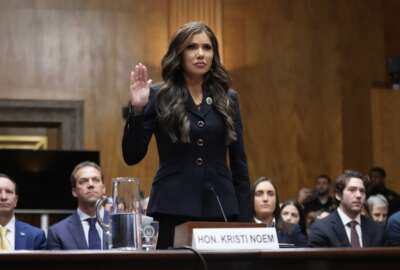Rep. Sherrill introduces legislation to clarify restrictions on full-time National Guard duty
If passed, the bill would require the consent of governors of the state providing National Guard forces and the state receiving them if the president requests.
- New Jersey Representative Mikie Sherrill has reintroduced legislation that would clarify limitations on full-time National Guard duties. Sherrill said the bill is aimed at “preventing the politicization of the National Guard” and protecting guardsmen and women from improper domestic deployment.” If passed, the bill would require the consent of governors of the state providing National Guard forces and the state receiving them if the president requests National Guard units under Title 32. It would also clarify that the Posse Comitatus Act, which prohibits the troops from domestic law enforcement missions, applies to all troops under federal command and control regardless of their status. (Sherrill introduces legislation to clarify restrictions on full-time National Guard duty - Rep. Mikie Sherrill)
- Federal agencies are being told they have until the close of business tomorrow to update their telework policies and bring them in line with the return-to-office memo President Trump issued earlier this week. Guidance the Office of Personnel Management issued yesterday said the new policies should require “eligible employees” to work full time at their respective duty stations, and that exceptions need to be approved by agency heads. The OPM guidance claims existing telework policies have left federal office buildings “mostly empty” and that they are “serving as a national embarrassment.” (Federal agencies have until Friday close of business to update telework policies - Office of Personnel Management)
- Department of Homeland Security employees are getting a quick return-to-office mandate. Acting Homeland Security Secretary Benjamine Huffman has ordered all DHS components to recall employees to in-person work. In a memo signed out Monday, Huffman suggests remote work at DHS has been abused. He said DHS components should report back to him in 30 days on employees who are not reporting to the office. Huffman said valid reasons for continuing remote work can include lack of adequate office space, the physical inability of the employee to work in-person or legal issues. (DHS head orders in-person work "to the maximum extent" - Federal News Network)
- More details are emerging about President Trump’s federal hiring freeze executive order. A memo from the Trump administration confirms that military personnel, as well as hires for many national and public security positions, are exempt from the freeze. But there are some additional exemptions as well. Agencies can still make new hires for the Postal Service, and for federal employees who are up for an internal promotion. OPM said agencies should also review any recent appointments in the Pathways Program for early-career workers on a case-by-case basis. Agencies can make further requests for exemptions to the hiring freeze by submitting paperwork to the Office of Personnel Management. (Federal civilian hiring freeze guidance - Office of Personnel Management)
- All federal regulations that were in the process of being finalized are on hold for the next 60 days. President Donald Trump's memo signed out Monday freezes regulations so the new administration can review them and determine if they are still necessary. The White House has established a goal of removing 10 existing regulations for every new one issued. Russ Vought, the nominee to lead OMB, told Senate Budget Committee lawmakers yesterday that reducing the number of regulations on the books will be one of his top priorities, should he be confirmed.(Trump orders regulations freeze for 60 days - White House)
- President Trump directed agencies to return the federal workforce to the office full-time. But many feds are concerned about negative impacts. Many federal employees said a full return-to-office would worsen productivity, employee retention and much more. That’s according to the results of a recent Federal News Network online survey, which received 4,600 responses. When asked what factors would be most negatively impacted under a return-to-office mandate, 71% of respondents said the commute, making it the number one selection among survey takers. Work-life balance was the second-most selected option. Some feds, however, said collaboration with coworkers could improve with more in-person work.(Federal return-to-office directive will hurt productivity, survey respondents say - Federal News Network)
- President Donald Trump is revisiting plans from his first term to make federal buildings more “beautiful.” One of his executive orders directs the General Services Administration and the heads of other agencies to come up with recommendations on how to make their buildings stand out visually as public spaces. Trump said that feedback will lead to revisions in guiding principles for federal architecture. Trump signed a similar executive order during his first term in office. (Promoting Beautiful Federal Civic Architecture - White House)
- House Democrats said the Trump administration’s hiring freeze is taking a toll on the air traffic control workforce. President Donald Trump’s hiring freeze executive order doesn’t apply to the military immigration enforcement national security or public safety. But top Democrats on the House Transportation and Infrastructure Committee said air traffic controller employees at the Federal Aviation Administration are not exempt. Congress directed the federal government to increase staffing in an FAA reauthorization bill that passed last year. (Ranking Members Larsen, Cohen statements on Trump’s dangerous freeze of air traffic control hiring - House Transportation and Infrastructure Committee)
- The leader of the House Homeland Security Committee is again pushing a big cyber workforce bill. Committee Chairman Mark Green said passage of the Cyber PIVOTT Act is at the top of his agenda this Congress. The bill would provide scholarships for two-year degrees in exchange for government service. The program would be run by the Cybersecurity and Infrastructure Security Agency. The bill was passed unanimously by the homeland security committee in the last congressional session.(Chairman Green opens hearing on global threats - House Homeland Security Committee)
- OPM turned its top technology position over to a political appointee. The Trump administration has installed Greg Hogan as the new chief information officer at the Office of Personnel Management. He replaces Melvin Brown, who just ascended to the position a week ago. Brown remains with OPM. He is the new deputy executive director for human capital data management and modernization. There isn't a lot of details about Hogan's background but sources tell Federal News Network that he's from Iowa and hasn't ever been a CIO before. Hogan comes to OPM to help lead several of the Trump administration's major initiatives like hiring reform. (OPM names new CIO - OPM email)
- President Donald Trump directs the U.S. Northern Command to “seal” the border. The executive order requires Gen. Gregory Guillot, who leads NORTHCOM, to prepare a contingency plan laying out how the command will go about “sealing” the country’s border. It also tasks the command to implement a campaign plan which focuses on long-term strategy and directs the DoD to provide “continuous assessments of all available options to protect the sovereign territory of the United States from mass unlawful entry.” Tasking NORTHCOM with this mission would require the Defense Department to pull forces from other service branches since the command doesn’t have permanent forces.
(Trump directs NORTHCOM to ‘seal’ the border - Federal News Network)
Copyright © 2025 Federal News Network. All rights reserved. This website is not intended for users located within the European Economic Area.
Michele Sandiford
Michele Sandiford is a digital editor at Federal News Network.






